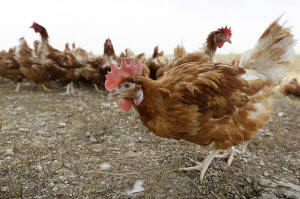China slaps extra tariffs of up to 15% on imports of major US farm
exports, adds trade curbs
[March 04, 2025] BEIJING
(AP) — China announced Tuesday it will impose additional tariffs of up
to 15% on imports of key U.S. farm products, including chicken, pork,
soy and beef, and also expanded controls on doing business with key U.S.
companies.
The tariffs announced by the Commerce Ministry are due to take effect
from March 10, though goods already in transit will be exempt until
April 12. They follow U.S. President Donald Trump’s order to raise
tariffs on imports of Chinese products to 20% across the board. Those
took effect on Tuesday, along with 25% tariffs on imports from Canada
and Mexico.
Imports of U.S. grown chicken, wheat, corn and cotton will face an extra
15% tariff, a notice by the ministry said. Tariffs on sorghum, soybeans,
pork, beef, seafoods, fruit, vegetables and dairy products will be
increased by 10%.
Also Tuesday, Beijing placed 10 more U.S. firms on its unreliable entity
list, which would bar them from engaging in China-related import or
export activities and from making new investments in the country. Some
already likely face restrictions on trade with China if their products
can be used for both military and civilian purposes.
The firms listed are TCOM,Limited Partnership; Stick Rudder Enterprises
LLC; Teledyne Brown Engineering; Huntington Ingalls Industries; S3
AeroDefense; Cubic Corporation; TextOre; ACT1 Federal; Exovera and
Planate Management Group.
Separately, China added 15 U.S. companies to its export control list,
including aerospace and defense companies like General Dynamics Land
Systems and General Atomics Aeronautical Systems, among others.
“China has decided to include 15 U.S. entities that endanger China’s
national security and interests in the export control list, prohibiting
the export of dual-use items to them,” the ministry said in a statement.

While the tariffs Beijing has imposed on American farm products are
sweeping, China held back from imposing higher tariffs across the board,
and “both sides showed restraint,” said Sun Chenghao, an international
relations professor at Beijing's Tsinghua University.
“The U.S. hopes to get a trade deal with China in the end,” Sun said.
“For the long term, it is possible that China and the U.S. will continue
to negotiate, but the current atmosphere is not good.”
[to top of second column] |

Chickens walk in a fenced pasture at an organic farm in Iowa on Oct.
21, 2015. (AP Photo/Charlie Neibergall, File)
 By raising tariffs, the U.S. has
repaid kindness with enmity, Chinese Foreign Ministry spokesperson
Lin Jian said.
“I would like to reiterate that the Chinese people have never been
afraid of evil, do not believe in ghosts, and have never been
bullied,” Lin said.
China's is a major importer of American farm products, though its
purchases dipped after Trump launched a trade war during his first
term in office, and then recovered. In 2024, China imported $24.7
billion in farm products from the U.S., 14% of its $176 billion in
total farm exports. Mexico was the largest importer of U.S. farm
goods, followed by Canada.
The Chinese Commerce Ministry included about two dozen U.S. farm
exports subject to additional 15% tariffs, including chicken feet
and wings, and 711 items subject to an extra 10% tariff.
In 2021-22, the United States logged record export values to China
for soybeans, corn, beef, chicken meat, tree nuts, and sorghum.
Cotton exports to China also rebounded, according to the U.S.
Department of Agriculture. U.S. farm exports to China totaled $33.8
billion in fiscal 2023 and $36.4 billion in fiscal 2022.
China has been diversifying its sources for farm imports, buying
more soybeans from Brazil and Argentina, among other growers.
Beijing is prepared to hit back, said Xu Botao, research director of
the GoGlobal Institute at EqualOcean, a Shanghai-based Chinese
think-tank “The Chinese government and Chinese companies will not be
easily frightened and give up resisting unjust trade pressure from
the U.S. and other countries,” Xu said.
The end result will depend on how the U.S. side approaches Beijing,
analysts said.
“So far, the U.S. hasn’t sent a positive signal. If the U.S. wants
to talk, it should not damage the atmosphere,” Sun said.
All contents © copyright 2025 Associated Press. All rights reserved |